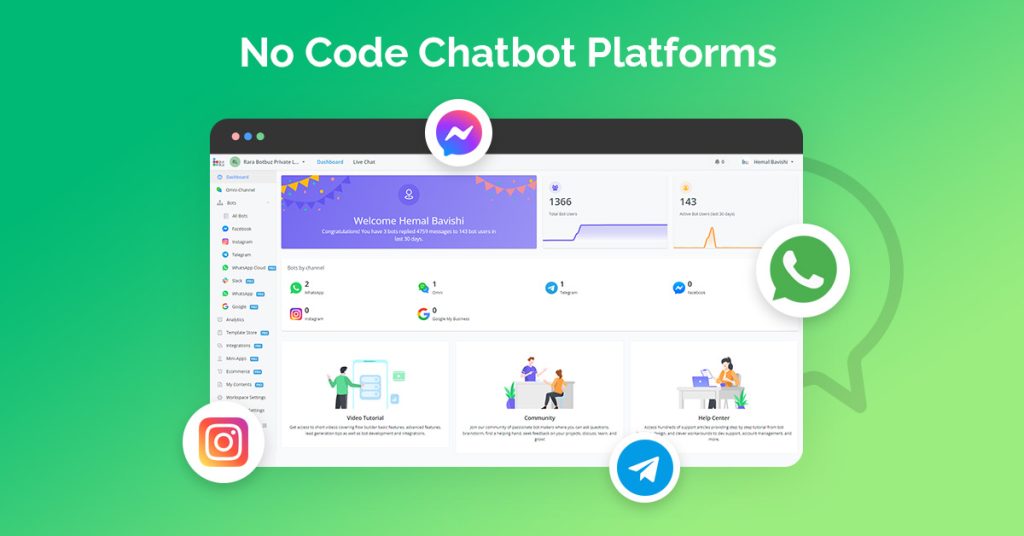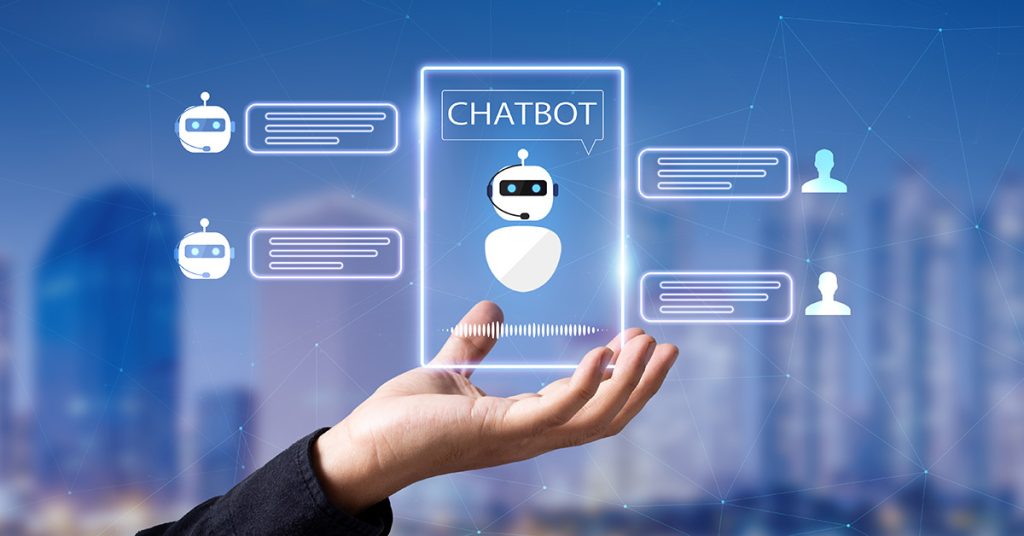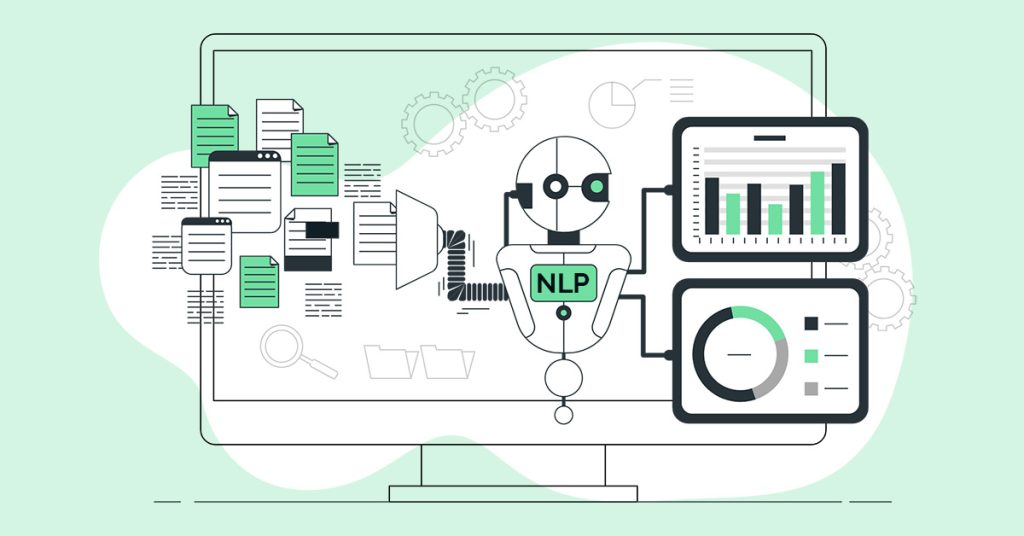Overview of RPA Chatbots :
RPA chatbots are a powerful combination of two automation technologies. 1) Robotic Process Automation (RPA) and 2) chatbots. Let’s break down each part :
- RPA automates repetitive tasks within computer systems. Imagine a software robot that can tirelessly follow a set of instructions. Like copying and pasting data between applications or filling out forms.
- Chatbots are conversational interfaces that interact with users through text or voice. They can answer questions, provide information, and even complete simple tasks.
By combining these two, RPA chatbots become intelligent virtual assistants. It can handle more complex interactions. They can understand user requests through conversation. It can then leverage RPA to automate tasks behind the scenes, streamlining processes. Thus, improving efficiency.
Understanding RPA Chatbots :
Definition and Key Characteristics :
An RPA chatbot is a software program. It combines conversational capabilities of a chatbot with the automation power of RPA. Here’s what defines them :
Conversational Interface : They interact with users through natural language processing. It understands questions & responds in a way that mimics human conversation.
Task Automation : They leverage RPA to automate tasks behind the scenes. This could involve accessing data from different systems. It also fills out forms, or triggers workflows.
Seamless Integration : The user experience is seamless. Users interact with the chatbot. They are unaware of the RPA working in the background to complete their requests.
How They Differ from Traditional Chatbots :
Traditional chatbots are often rule-based, relying on pre-programmed responses and decision trees. They struggle with complex requests or unforeseen situations. RPA chatbots can leverage RPA to access information. It can complete actions in real-time, making them more versatile and intelligent.
The Role of RPA in Chatbots :
RPA empowers chatbots by :
- Expanding capabilities : It allows chatbots to interact with external systems and databases. It fetches information or completes tasks that traditional chatbots couldn’t handle.
- Improving efficiency : RPA automates time-consuming tasks, allowing chatbots to resolve user requests faster.
- Enhancing accuracy : RPA eliminates the human error associated with manual tasks. Thus, ensuring data is processed accurately.
In essence, RPA acts as the invisible engine that powers RPA chatbots. Thus, enabling them to go beyond simple conversation and deliver real-world results.

Applications of RPA Chatbots :
RPA chatbots offer a wide range of applications across various departments. Thus, transforming the way businesses operate. Here are some key areas where they shine :
A. Customer Service and Support :
Handling Routine Inquiries and FAQs : Chatbots can answer frequently asked questions (FAQs) about products, services, orders, and billing. Thus, freeing up human agents for more complex issues.
Providing Personalized Assistance and Troubleshooting : By integrating with CRM systems, chatbots can access customer data & offer personalized support. They can also guide users through troubleshooting steps for common problems.
B. Business Process Automation :
Streamlining Repetitive Tasks and Processes : RPA chatbots can automate a variety of back-office tasks. It includes data entry for invoices, order processing, and report generation. This improves accuracy, increases efficiency, and frees up human resources for higher-value activities.
Automating Data Entry, Validation, and Processing : RPA chatbots can extract data from various sources like emails, forms, and documents. Thus, ensuring accuracy and speeding up processing times.
C. Internal Operations and Employee Support :
HR Processes Automation : Chatbots can automate routine HR tasks. It onboard new employees, managing leave requests, and answering benefits-related questions.
IT Helpdesk Support and Ticket Management : Chatbots can handle basic IT support inquiries. Thus, freeing up IT staff for more complex issues. They can also automate ticket creation and routing, improving resolution times.
Advantages of RPA Chatbots :
RPA chatbots offer a compelling value proposition for businesses seeking to improve efficiency, reduce costs & enhance customer & employee experiences. Here’s a closer look at the key advantages :
Increased Efficiency and Productivity : It automates repetitive tasks & streamlines processes. Thus, RPA chatbots free up human employees for more strategic work. This leads to a significant boost in overall productivity and efficiency.
Cost Savings Through Automation : Automating tasks traditionally done by human agents reduces labor costs. Additionally, RPA chatbots help minimize errors and rework, leading to further cost savings.
Enhanced Accuracy and Consistency : RPA eliminates the possibility of human error in data entry and task execution. This ensures consistent and accurate results, improving the overall quality of work.
Improved Customer and Employee Satisfaction : RPA chatbots provide faster and more efficient service to customers. It reduces wait times and frustration. For employees, chatbots can automate manual tasks and provide self-service options. Thus, improving job satisfaction and productivity.
Essential Tools for RPA Chatbots :
Building and deploying effective RPA chatbots requires a combination of specialized tools. Here’s a breakdown of the key categories :
RPA Platforms :
These platforms provide the core functionality for automating tasks within computer systems. They allow you to design software robots (bots). It can mimic human actions while interacting with various applications.
Botbuz is a popular RPA platform. Here’s a brief overview of Botbuz along with some other well-regarded options :
Botbuz : A user-friendly platform that caters to businesses of all sizes. It offers features like drag-and-drop process building, pre-built connectors for various applications & cloud-based deployment.
Here’s a overview of Botbuz RPA platform :
Ease of Use : A user-friendly interface is crucial for building and deploying software robots. It is especially if you don’t have a large IT team. Botbuz is user friendly as it is no code chatbot building platform.
Functionality : Botbuz platform offers features like screen scraping, data manipulation, process recording & API integrations.
Scalability: As your automation needs grow, Botbuz scales to accommodate increased workloads.
Security: Botbuz RPA platforms handle sensitive data, so robust security features are essential.
Integration Tools :
Once you have your RPA platform in place. Then one needs tools to connect it with the chatbot framework you choose. These tools enable communication between the RPA platform, chatbot framework and existing enterprise systems. Common solutions include :
API Management Tools : These tools simplify API integrations. Thus, allowing the chatbot to access data and functionality from various applications. APIs (Application Programming Interfaces) act as messengers between the chatbot and other systems. Thus, enabling data exchange.
Middleware Platforms : Middleware acts as a bridge between disparate systems. Thus, ensuring smooth data exchange between the chatbot and backend systems. If your RPA platform and chatbot framework don’t connect, middleware can provide the necessary glue.

Analytics and Monitoring Tools :
These tools are crucial for tracking the performance of the RPA chatbot. It identifies areas for improvement. Examples include :
Chatbot Analytics Dashboards : These dashboards provide insights on user interactions, conversation trends, and chatbot performance metrics. It includes resolution rates and satisfaction scores.
RPA Process Monitoring Tools : These tools monitor the execution of automated tasks within the RPA platform. Thus, ensuring smooth operation and identifying potential bottlenecks.
By leveraging these essential tools, businesses can build & deploy powerful RPA chatbots that streamline workflows. It also enhances user experiences, and unlock the full potential of intelligent automation.
Choosing the right tools depends on your specific needs and budget. Many RPA platforms and chatbot development frameworks offer built-in analytics functionalities. For a more comprehensive view, dedicated third-party analytics & monitoring tools may be necessary.
Challenges and Considerations for RPA Chatbots :
While RPA chatbots offer significant benefits, there are also challenges to consider :
- Data Security and Privacy Concerns :
Data Access : RPA chatbots access and manipulate data across various systems. Robust security measures are essential to prevent unauthorized access and data breaches.
User Data Privacy : Chatbots may collect personal information during interactions. Ensure compliance with data privacy regulations like GDPR and CCPA.
- Ensuring Regulatory Compliance :
Industry Regulations : Depending on your industry, there might be specific regulations for data handling & automation. Ensure your RPA chatbot adheres to these regulations.
Auditability : Maintain a clear audit trail of all chatbot interactions and RPA actions. This is crucial for ensuring traceability and accountability.
- Managing Complexity and Scalability :
Integration Complexity : Integrating RPA chatbots with multiple systems can be complex. Carefully plan integrations to ensure smooth data flow and avoid bottlenecks.
Scalability Challenges : Chatbot usage grows. So managing the complexity of automation workflows and chatbot interactions can become challenging. Choose tools and platforms that can scale to meet your future needs.
Future of RPA Chatbots with Botbuz :
RPA chatbots represent a powerful force in transforming business processes. They combine the efficiency of automation with the convenience of natural language interaction. It also streamlines workflows. Thus, enhancing user experiences, and driving significant cost savings.
There are challenges to address regarding data security, regulatory compliance, and managing complexity. The potential benefits of RPA chatbots are undeniable. By considering these challenges and selecting the right tools, businesses can build robust and secure RPA chatbot solutions.
In this context, Botbuz emerges as a viable RPA platform choice. Botbuz can be a compelling option depending on your specific needs. Its strengths lie in its user-friendliness and potential affordability. However, thorough evaluation is crucial to ensure it aligns with your technical expertise, existing integrations & scalability requirements.
As RPA technology continues to evolve, so too will the capabilities of RPA chatbots. Botbuz, along with other RPA platforms, will play a key role in this exciting future. By embracing RPA chatbots and leveraging the potential of platforms like Botbuz, businesses can unlock new levels of efficiency. Thus, improving customer & employee satisfaction, and gaining a competitive edge in the ever-evolving digital landscape.




